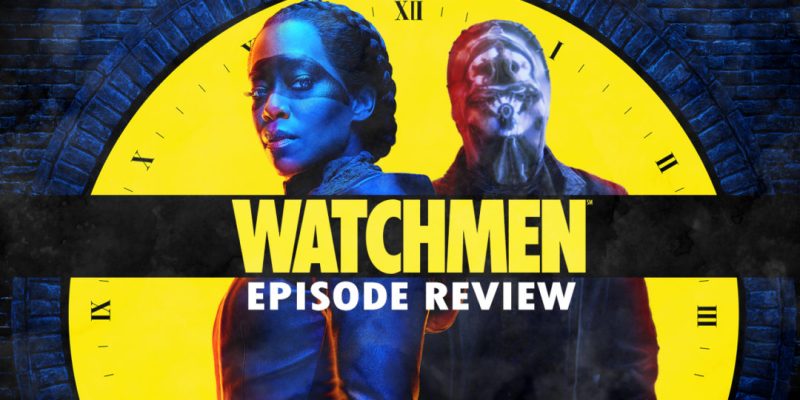This review contains spoilers for Watchmen, episode 4, “If You Don’t Like My Story, Write Your Own.”
After an episode that felt like Watchmen was catering to fans of the graphic novel, it’s great to see the series finally explore its various mysteries and give the audience some of the answers that they were looking for. In “If You Don’t Like My Story, Write Your Own,” the answers come with the appearance of the show’s most mysterious character to date, Lady Trieu (Hong Chau of Downsizing), a trillionaire building a strange clocktower in the middle of Tulsa.
Her riveting introduction shows her telling a married couple that they have three minutes to give her their house. Trieu backs up her determination with a ludicrous offer, giving them the chance to adopt a child that she grew using the infertile couple’s DNA. The writers don’t provide any answers about why she was so eager to buy their land, but that’s standard procedure for Watchmen.
While episode 3 focused on Agent Laurie Blake (Jean Smart of Legion) to the detriment of other characters, nearly everyone gets a chance to shine in episode 4. Looking Glass (Tim Blake Nelson) is shown to be an interdimensional conspiracy theorist, Adrian Veidt (Jeremy Irons) is revealed to have been a prisoner at his estate for four years and trying to escape, and Angela Abar’s (Regina King) relationship with her family is explored in greater detail. It’s the best mix of plot progression and character development that the series has delivered so far.

While most of the themes introduced in the first episode of Watchmen seem to be long forgotten, a new one seems to have sprouted up in their place: the exploration of family dynamics. Lady Trieu opens the episode stressing how people can refuse to make decisions due to the complications that arise from a family’s legacy, but she’s actually quite indifferent to the concept of family. She refuses to walk her daughter to bed after she had a nightmare so she can continue her conversation with Angela’s grandfather, Will Reeves (Louis Gossett Jr.).
It is revealed that Lady Trieu and her corporation are responsible for rescuing Will, and they seem to have forged an alliance over some mysterious goal. Both parties discuss an event that will happen in three days, with Trieu adamant that Will throw in fully with her before it begins. Will’s interpretation of family is more ambivalent, given that his own was ripped from him as a child. He seems emotionally distant from Angela, openly toying with her instead of telling her his intentions and motivations.
By contrast, Angela is very focused on protecting her family. When Agent Blake pays her husband a visit to question him, Angela snaps at her for daring to involve her family in the investigation of Judd’s murder. She’s trying her best to be a good mother, whether it’s showing concern for her two youngest children when they see a 7th Cavalry member murdered at Judd’s funeral or talking with her husband about the escalating events around them.

Angela is concerned about her immediate family. Even if Will is her grandfather, he’s been absent for so long that she doesn’t consider him to be family. If he disappeared for a century only to return to play mind games, putting her family at risk by association, Angela wants to get him to leave her alone.
The complicated family dynamic in Watchmen exists beyond the characters with family on screen. Agent Blake’s fellow FBI agent Dale Petey (Dustin Ingram) states matter of factly that the Comedian raped Blake’s mother and discovering her parentage traumatized her. Laurie once took on the vigilante persona Silk Spectre to cope with her overbearing mother, and when she tries to psychoanalyze Angela and piece together why she created the Sister Night moniker, Angela replies calmly that she did it to protect her identity. Angela says there was no defining trauma, though Blake would argue otherwise.
Adrian also is shown to have “children,” whom he gathers in a lake and grows them from infants to adults in a matter of seconds to turn them into his servants. They may be clones, but Adrian’s treatment of his children is inhumane. He sacrifices them in an attempt to escape from his prison, and after one dies, he just fishes up another one with little regard for the rest. Lady Trieu’s treatment of her daughter feels similar to Adrian’s treatment of his clones, with Trieu building a statue in her home of Adrian as a show of honor to her idol. Adrian has always only been interested in using people as a means to an end.

It’s odd that Watchmen would quickly abandon its racial metaphors so early into its run, but this new family-focused direction was wholly appreciated. The show unfortunately still has its bad habit of constantly introducing more mysteries and nixing previously established elements from prior episodes. It looks like the “American Hero Story” show-within-a-show has been sidelined for now. Instead of that avenue we get a mysterious vigilante in spandex that covers himself in oil and slides into sewer drains. Worthy trade-off?
It’s still very difficult to say how all of the show’s pieces will come together. Looking Glass’ paranoia about interdimensional beings seemed to be just an odd character quirk, but the preview of the next episode shows that we’re going to get a lot more information about these believers. That lack of focus is made all the more apparent when you realize that the 7th Cavalry, who were originally billed as the central antagonists, didn’t appear once in this episode and haven’t played a major role in the plot since the premiere.
Hopefully the show will gain more focus and tie several of these loose story beats together as it progresses. “If You Don’t Like My Story, Write Your Own” is the best episode since the premiere and is hopefully a good omen of things to come. The show needs to spend more time answering its own questions rather than creating new ones.
